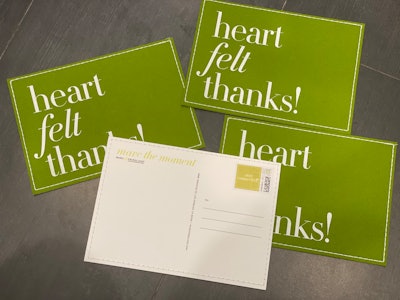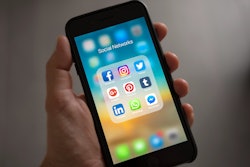
Marc Friedland is on a mission. The Los Angeles-based founder of design and branding agency Marc Friedland Couture Communications has challenged himself to a monthlong "experiment in gratitude" he's calling #30ThankYous. "Each day, I take a few moments and reflect on a client, colleague, or a long-lost friend, and take a break from my devices and Zoom calls to put pen to paper and write a note of gratitude—and actually mail it," he explains, noting that he designed special thank-you cards and stamps for the project and is also including pre-stamped cards for the recipient to pay it forward.
"This is a time to really take stock and consider how your communications and outreach come from a place of authenticity and compassion," he adds. "I share a note about the projects we’ve worked on together, their support, or just how they made a difference in my life."
During the COVID-19 pandemic—and the subsequent widespread event cancellations—it can be hard for event producers to navigate client relationships while remaining sensitive to the hardships many are facing. In addition to Friedland, BizBash chatted with producers around the world to learn how they’re navigating these uncharted waters. Here's their advice.
1. Above all, be sensitive.
“The most important thing is to be there for your clients and partners as a person first, and trust that the business will follow,” says Christian Henderson, account manager at G7 Entertainment Marketing in Nashville, who stresses that the idea of bringing humanity to client relationships has become even more crucial in the times of social distancing. “We're all equally isolated, yearning for a little human contact at a time when you literally cannot touch another human.”
Remember that clients may be juggling kids who are at home due to shuttered schools, or may be dealing with financial issues as well as sick family members, friends, or employees. “With many of our recurring clients, we have reached out to them to inquire about their personal safety, as well as that of their loved ones through text and emails,” notes Greg Jenkins, partner at Bravo Productions in Long Beach, California, who is using virtual lunches and after-work drinks to give clients space to communicate their anxieties. “It's been reassuring to let them know we are in this together.”
However, Chloe Mandell, CEO and founder of Portland-based Mandell Experiences, cautions against too much communication. “I'm actually holding off on client, sponsor, and vendor outreach except for those clients and vendors I was in direct contract with to redefine our terms,” she says, noting that her strategy will likely change as businesses adjust to the new normal. “I'm giving lots of space and understanding for a ‘mask on yourself before helping others’ mode. For those I'm closest with, I've found a simple text, ‘Checking in on you’ to be quite effective.”
2. Be a source of knowledge, and assure them you will handle any outstanding or future logistical needs.
When clients do seem ready to discuss business, offer them reassurance that you can handle whatever they need. “To alleviate [my clients’] stress, I am handling the negotiations for contracted sponsorships, working with our venues to secure new dates for hosted conferences, contacting all vendors to reassess costs and contracts, and chasing refunds or rollovers for all orders placed,” notes Melissa Park, a New York-based event producer.
Nashville’s Country Music Hall of Fame and Museum’s event sales team is taking a similar approach. “We want our clients to know that we have the details of their event handled,” says director of event sales Heather McCroskey. “We are their partner in this, and their event or meeting is one less thing they need to worry about at this time.”
“My goal is to help clients understand how the world has changed, and to navigate a path forward,” adds Amaia Stecker, managing partner at Pilar & Co in Alexandria, Virginia. “We've had conversations about creative approaches including video conferencing and turning their event virtual. I'm also working to help them identify opportunities for long-term changes that can be implemented now that will protect the health and safety of their attendees at future in-person events. We're also sourcing technology to implement virtual components to events that will exist after the pandemic.”
Related: 6 Tips for Pivoting an In-Person Event into a Virtual Experience
3. Send them personalized information and resources.
This is also a time to share resources that may benefit your clients, whether work-related or just fun. For example, Michelle McKenna Shuey, the New Jersey-based owner of The Effortless Affair, regularly plans children’s events—so she’s keeping an eye out for things her clients might like. “If I see someone on social media advertising a free class or child activity, I send it to clients who I think will enjoy it,” she explains. “For instance, Bella Princess is going live on Facebook with different princesses and characters. My client loves Disney Descendants. … I texted her the information so she could join.”
This is also a chance to position yourself as a thought leader and source of information, notes Peter Carey, president of North Carolina-based CareyOn Public Relations, who is using this time to become more active on his blog and in his newsletters. “[I’m giving clients] ideas for me to execute when we return to normal,” he says. “I am also giving them a few ideas on how to more effectively plan their event calendar and take advantage of the time we have off.”
Ultimately, the goal is not necessarily to ask for business right now—it’s to stay on clients’ radars for when business resumes. “When all the self-isolation and physical distancing ends, you want to be top-of-mind when it’s time to reschedule and rethink all those events,” notes Kelly Snider, principal at Reflect Management in Vancouver, who is scheduling monthly check-ins with her clients. “It’s all about authenticity and continuing to serve the people you work with.”
4. Find creative ways to keep in touch.
“Creating community and connecting is so important, especially right now,” notes Beth Lawrence, chief event officer of Beth Lawrence Meetings & Events in Philadelphia, who is hosting free virtual co-working and networking events. Similarly, Carey is hosting a virtual cocktail hour series every week, where participants learn to make two craft cocktails.
Related: Planning a Virtual Happy Hour? Raise a Digital Toast With These To-Go Cocktails
Will Gray, founder of Hidden Door Experiences in Australia, has also found another creative way to take his client relationships online: a remote lip sync battle. “We had to adapt quickly and developed a range of remote experiences to help keep businesses connected. For our clients, this has been a tool to keep engaging with them and keep on their radar,” he says. The Hidden Door team created its own version, singing Billy Joel’s “The Longest Time,” and then challenged clients to do the same. “We just finished a version that has 50 people singing a Dua Lipa song from seven different cities around the world!"
Virtual hang-outs can, of course, go beyond just fun and games. Feyisola Ogunfemi, owner of Washington, D.C.-based Statuesque Events, recently hosted a virtual open house for brides who are planning weddings for 2021. “People crave connection in this period, and that's what we are giving,” notes Ogunfemi.
5. Consider personalized gifts and handwritten notes.
“What do you know about your clients and their personal lives—birthdays or anniversaries or other special dates?” asks Snider. “This pandemic means that we are all missing out on important events and celebrations, so take this time to acknowledge those losses by remembering the special days.”
Like Friedland, Snider suggests sending a handwritten note or a gift, both as a way to support your clients and your go-to suppliers. “Send flowers from your floral designer, a bottle of wine from your favorite winery, some specialty foods or baking from a caterer that you love to work with," she says. "It doesn’t have to be expensive or break the bank. … Knowing and being known builds connection and loyalty, and we always want to continue to work with people with whom we have the strongest connections.”
Related: Event Canceled Due to Coronavirus? Send Attendees This Swag
Stecker is taking a similar approach. “Ultimately, I'm working to help clients and my supplier partners through a particularly stressful time by focusing on the needs of human nature: contact and connection,” she says. “Clients that I would see on a regular basis, I'm sending a delivery dinner (pizza and wine kits, taco night, or family dinners) that helps me support local businesses (including caterers!) and help the client through this, especially if they have kids. It's a simple moment of surprise and delight that resolves a pain point.”
6. Use your social media wisely.
“Staying engaged with [clients] on social media is really the most natural, fun way to communicate on a weekly basis,” points out Grace Gittinger, principal of GG & Co. in Austin. It also offers a good way to show clients what you’re going through, to remind them that everyone is facing similar challenges. Shuey adds, “I am keeping active on social media with what I am doing to keep busy and with my three kids. I have done a lot more with Instagram stories to try and keep my personality and business top of mind.”
Lauren McCabe Herpich, owner of Local Food Adventures in Oakland, California, has been using social media giveaways to connect with current and future clients. “In order to keep building my database and continue my support of the local restaurants and small specialty food shops that I work with, I've been holding a daily gift card giveaway on my Instagram and Facebook feeds,” she explains. “My goal is to financially help my partners with a little bit of cash flow, and to remind people that gift cards are a fantastic way to support businesses now—and something to look forward to when we are all comfortable being back together in the future.”
Valerie Bihet, director of VIBE Agency in Miami, points out another practical benefit of social media. “We have found many people have unfortunately been laid off or furloughed, which prevents them from opening their business email,” she notes. “So we’ve been working on other ways to contact them, like putting more into social media. We’ve been continuing to post regularly on Instagram and LinkedIn so people know we are here and working, even if we are in remote offices.”



















